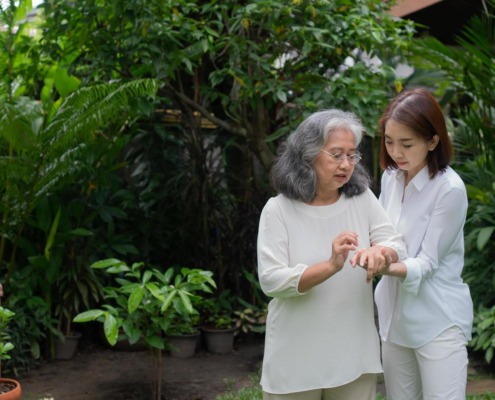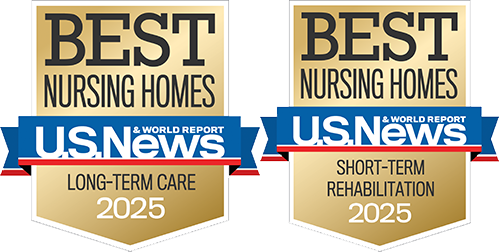Navigating Senior Health: Essential Insights for Caregivers
 Taking care of an elderly loved one can be both rewarding and challenging. As a caregiver, you play a vital role in enhancing their quality of life and ensuring they have the support they need to age gracefully. However, navigating senior health can be overwhelming, especially if you don’t have prior experience or medical background.
Taking care of an elderly loved one can be both rewarding and challenging. As a caregiver, you play a vital role in enhancing their quality of life and ensuring they have the support they need to age gracefully. However, navigating senior health can be overwhelming, especially if you don’t have prior experience or medical background.
In this guide, we’ll provide essential insights for caregivers to better understand and manage senior health. From physical and mental well-being to common health conditions and preventive measures, we’ve got you covered!
Jump to article sections:
- The Aging Process
- Physical Well-being
- Mental Well-being
- Common Health Conditions
- Regular Screenings and Immunizations
- When to Consider Assisted Living
1. The Aging Process
Aging is a natural and inevitable part of life. It involves physical, psychological, and social changes that occur over time. As we age, our bodies undergo various transformations that affect our overall health and well-being. Understanding the aging process can help caregivers provide better care for their loved ones.
Some common changes associated with aging include:
- Decreased muscle mass and bone density
- Slower metabolism
- Reduced immune system function
- Cognitive decline
It’s important to note that everyone ages differently, so it’s essential to pay attention to your loved one’s individual needs and behaviors.
2. Physical Well-being
As people age, their bodies go through various changes that may affect their physical well-being. It’s important for caregivers to be aware of these changes and provide necessary support, such as helping with daily activities or arranging medical appointments.
Mobility
One common issue among seniors is a decline in mobility. This can be due to age-related changes, chronic health conditions, or injuries. As a caregiver, you can help by encouraging your loved one to stay active through low-impact exercises like walking and stretching. You may also need to make some modifications in the home environment to ensure their safety and accessibility.
Nutrition
Good nutrition is essential for overall health, but it becomes even more important as we age. As metabolism slows down and appetite decreases, seniors may struggle to maintain a healthy diet. As a caregiver, you can help by preparing nutritious meals and snacks and encouraging them to eat a variety of foods from all food groups.
Some tips for building a balanced diet for seniors include:
- Limiting processed foods high in sugar, sodium, and unhealthy fats
- Incorporating calcium-rich foods to support bone health
- Ensuring adequate protein intake for muscle maintenance and repair
Sleep
Many seniors struggle with sleep issues, such as insomnia or frequent waking during the night. Poor sleep can have a significant impact on their physical and mental health. As a caregiver, you can help by creating a comfortable sleep environment and establishing a bedtime routine that promotes relaxation and restful sleep.
3. Mental Well-being
Mental health is just as important as physical health, but it’s often overlooked when caring for seniors. As we age, our brains go through changes that may affect cognitive function and emotional well-being. It’s essential for caregivers to understand the importance of mental health for seniors and provide necessary support.
Social Connections
Loneliness and isolation are common issues among seniors, especially those who live alone or have limited mobility. As a caregiver, you can help by encouraging your loved one to maintain social connections through activities like joining clubs or attending community events. The importance of socialization for seniors cannot be overstated, as it can improve mood, cognitive function, and overall well-being.
Cognitive Health
As we age, our cognitive abilities may decline due to changes in the brain. This could lead to memory loss, difficulty with decision-making, and other challenges. As a caregiver, it’s important to be patient and understanding when communicating with your loved one and seek professional help if needed.
4. Common Health Conditions
Along with age-related changes, seniors may also face various health conditions that require ongoing management and care. Some of the most common health conditions include:
- Arthritis: Joint pain and stiffness, which can make daily tasks challenging.
- Diabetes: A chronic condition that affects blood sugar levels and requires monitoring and medication.
- Dementia: A decline in cognitive function that affects memory, thinking, and behavior.
- Osteoporosis: Bone density decreases, leading to an increased risk of fractures.
As a caregiver, it’s crucial to educate yourself about these health conditions and work closely with healthcare professionals to manage them effectively.
5. Regular Screenings and Immunizations
 Preventive care is crucial for seniors to maintain their health and catch any potential issues early on. As a caregiver, it’s essential to ensure your loved one receives regular screenings, such as blood pressure checks, cholesterol tests, and cancer screenings. It’s also important to stay up-to-date with recommended immunizations, including the flu shot and pneumonia vaccine.
Preventive care is crucial for seniors to maintain their health and catch any potential issues early on. As a caregiver, it’s essential to ensure your loved one receives regular screenings, such as blood pressure checks, cholesterol tests, and cancer screenings. It’s also important to stay up-to-date with recommended immunizations, including the flu shot and pneumonia vaccine.
6. When to Consider Assisted Living
Deciding when to consider assisted living for a senior loved one can be a challenging yet crucial decision. It’s important to recognize key signs that indicate this transition might be beneficial. If a loved one is experiencing declining health, such as frequent hospital visits or worsening chronic conditions, assisted living could provide the necessary support and medical attention.
Safety concerns, like increased falls or difficulty managing daily activities, also signal the need for a more secure living environment. Additionally, seniors often benefit from the social interaction and community life that assisted living offers, which can combat feelings of isolation and improve overall well-being.
Lastly, it’s understandable if you as the caregiver need additional support and assistance with caring for your loved one. Assisted living can provide a team of trained professionals who can help alleviate some of the responsibilities and allow you to spend quality time with your loved one.
For high-quality assisted living in Wauwatosa, Wisconsin, trust Harwood Place. We offer a continuum of care that includes independent living, assisted living, and memory care services. Our goal is to provide a safe and supportive environment for seniors while promoting independence and overall well-being. Contact us to learn more about our community and schedule a tour at Harwood Place today.




 Dr. Champalal Gupta, MD
Dr. Champalal Gupta, MD



